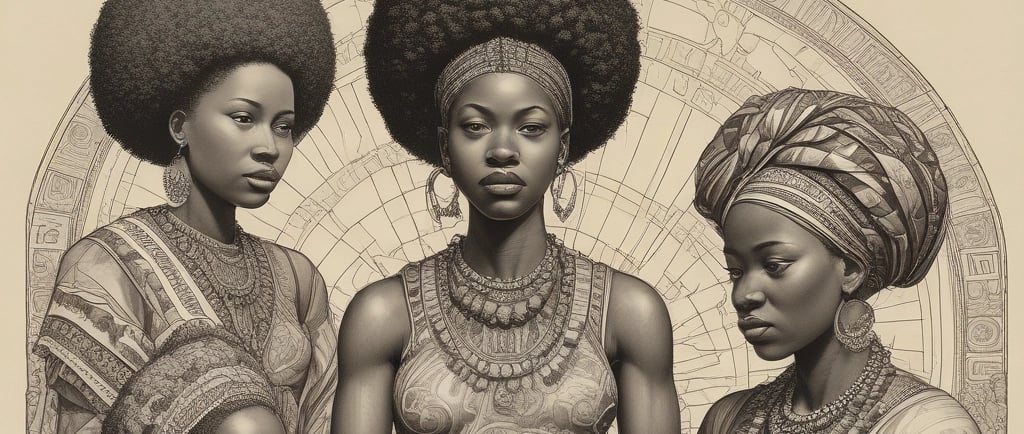Launch your professional website today Here
Reexamining Afrocentrism: A Critical Analysis of Its Claims on Ancient Egyptian History
This article summarises some peer-reviewed research, as well as part of the history of the Afrocentric group, to challenge simplistic narratives. This is especially necessary now, as Afrocentric ideas are on the rise. This article reflects our view that history should prioritise evidence of political activism, even if well-intentioned.
iswti.com Team
10/3/20255 min read


Understanding Afrocentrism: Origins and Ideological Goals
Afrocentrism is an intellectual and cultural movement that emerged primarily in response to Eurocentric narratives, which have historically marginalized African contributions to civilization and history. It seeks to reposition African people and their cultures at the center of historical analysis, challenging the widely accepted narratives that often diminish their significance. The term itself encapsulates a commitment to viewing the world from an African perspective, promoting the richness and diversity of African cultures, histories, and achievements.
The origins of Afrocentrism can be traced back to the late 20th century, growing out of the broader context of the civil rights movements and decolonization efforts across Africa and the African diaspora. Key figures like Dr. Molefi Kete Asante played a significant role in articulating the principles of Afrocentrism, highlighting the need for a narrative that celebrates African identity rather than allowing it to be defined through a Eurocentric lens. This movement finds its ideological roots in the desire to reclaim African heritage and encourage a positive self-image among Africans and people of African descent worldwide.
The fundamental objectives of Afrocentrism include redefining the cultural narrative surrounding Africa and its historical figures. By emphasizing the accomplishments of civilizations such as ancient Egypt, Afrocentrism aims to rectify misconceptions regarding Africa's role in global history. This perspective challenges the long-established views that often relegated ancient Egyptian history to a footnote in the annals of Western civilization, advocating for a recognition of its profound influence on various aspects of culture, philosophy, and science.
Thus, Afrocentrism not only serves as a means of reclaiming African identity but also as a critical framework through which the cultural significance of ancient civilizations, particularly Egypt, can be reassessed and appreciated within the broader context of world history.
Claims of Afrocentrism Regarding Ancient Egypt
The claims made by Afrocentrism concerning ancient Egypt primarily center around the ethnicity and cultural identity of the ancient Egyptians. Afrocentrist scholars argue that ancient Egyptians were fundamentally African and should thus be credited as part of the broader African civilization. This perspective posits that many of the contributions to global civilization, including advancements in mathematics, astronomy, and art, originated from this ancient African society. The assertion is that the historical narrative surrounding ancient Egypt has been Eurocentrically biased, leading to the marginalization of its African roots.
Additionally, Afrocentric viewpoints often highlight significant historical figures, such as the Egyptian Kings - called as Pharaohs for commercials, as exemplars of African leadership and civilization. Notable personalities like Tutankhamun and Ramses II are frequently referenced to emphasize the African identity of Egypt, supported by claims of their features and characteristics depicted in ancient sculptures and writings. Proponents argue that the influence of ancient Egyptian culture extended far beyond the Nile Valley, affecting regions across Africa and contributing to the development of various other civilizations.
The historical context for these claims is rooted in a reaction against longstanding narratives that have often depicted ancient Egyptians as racially ambiguous or even as symbols of a European lineage. Afrocentrism emerged as a scholarly movement during the 20th century, when scholars began to challenge established historical perspectives. Notably, the 1980s and 1990s saw a surge of interest in Africa's historical contributions, with initiatives promoting African history globally. Such movements aimed to reassess and reframe historical narratives, asserting that the achievements of ancient Egyptians are integral to the larger tapestry of human civilization.
However, these assertions have sparked considerable debate among historians and scholars, many of whom argue for a more nuanced understanding that considers the complex interplay of cultural influences in ancient Egypt. The implications of these claims extend beyond historical accuracy, impacting contemporary discussions about race, identity, and acknowledgment of African heritage in global history.
Critique of Afrocentrist Narratives: Evidence and Counterarguments
The discourse surrounding Afrocentrism and its claims regarding ancient Egyptian history often presents a narrative that simplifies and misrepresents the complexities of one of the oldest civilizations. While Afrocentrism seeks to reclaim African identity and heritage, it frequently overlooks the breadth of cultural interactions that influenced ancient Egypt. A critical assessment reveals several misinterpretations, which highlights the need for a more nuanced understanding of the socio-political landscape of the region.
First, archaeological findings illustrate the diverse influences that shaped ancient Egyptian civilization. Egypt's geographic location as a crossroads between Africa and the Near East facilitated a blend of ideas, trade, and people from varying cultures, thus creating a unique and complex societal fabric. Studies indicate that ancient Egypt heavily interacted with neighboring civilizations, including Nubians, Libyans, and several Levantine societies. This multifaceted exchange demonstrates that the identity of ancient Egyptians was not solely defined by African lineage but rather by a rich tapestry of cultural interactions.
Moreover, genetic research has further complicated the attempt to categorize ancient Egyptians purely within an Afrocentric framework. Genetic studies have shown that the ancient population of Egypt exhibited diverse genetic markers, indicating significant admixture with peoples from the Mediterranean and the Near East. Such findings suggest that attempts to fit ancient Egyptians solely into a monolithic racial construct are both historically and scientifically problematic.
Additionally, critically examining literary sources and historical texts affirms the multi-ethnic nature of ancient Egyptian society. For instance, depictions of foreign leaders and interactions with diverse populations in historical inscriptions indicate that ancient Egyptians embraced a wider identity rather than a narrow racial perspective. Therefore, while Afrocentrism contributes valuable insights into the historical narrative, it must account for the complexity and plurality of influences that played a critical role in the development of ancient Egyptian civilization. This balanced view underscores the importance of interdisciplinary approaches in historical scholarship, thereby providing a more comprehensive understanding of ancient Egypt's legacy.
The Importance of Historical Accuracy and Inclusivity in African Heritage Studies
Historical accuracy plays a pivotal role in African heritage studies, as it directly influences societal perceptions and inter-communal relations. Accurate scholarship enables a well-rounded understanding of the rich and diverse histories present within the African continent. Misrepresentation of historical facts can lead to misconceptions, stereotypes, and social divisions among various ethnic groups. Therefore, maintaining integrity in historical research is crucial for fostering a cooperative societal framework among different communities.
Furthermore, embracing an inclusive approach that acknowledges the diverse contributions of various ethnic groups is essential for a holistic understanding of African history. The African continent is characterized by an intricate tapestry of cultures, languages, and histories. Each ethnic group has played a significant role in shaping the continent's overall narrative, and it is vital to recognize and appreciate these contributions in order to achieve a more accurate representation of the past. Inclusivity in historiography not only promotes collaboration among scholars but also enhances the educational narrative surrounding African heritage.
Collaborative scholarship grounded in evidence-based discussions establishes a solid foundation for understanding complex historical dynamics. By integrating various perspectives, historians can uncover a more nuanced view of Africa's past, moving beyond singular narratives. This collective effort strengthens the legitimacy of historical claims and counters the erasure of less dominant narratives, which often results in the marginalization of specific communities. When history is presented inclusively, it empowers individuals by validating their cultural identities and fostering a greater sense of pride in their heritage.
In conclusion, historical accuracy and inclusivity are integral to the study of African heritage, impacting societal perceptions and community relations. By emphasizing collaborative scholarship, the historical narrative can be enriched, leading to a more comprehensive understanding of Africa's past that values all contributions. Such an approach not only cultivates a stronger community cohesion but also ensures that future generations appreciate the diverse elements that comprise African history.
Image generated by AI.


